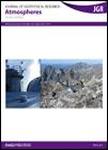版权所有:内蒙古大学图书馆 技术提供:维普资讯• 智图
内蒙古自治区呼和浩特市赛罕区大学西街235号 邮编: 010021

作者机构:Chinese Acad Sci Inst Atmospher Phys State Key Lab Numer Modeling Atmospher Sci & Geoph Beijing Peoples R China Univ Chinese Acad Sci Beijing Peoples R China
出 版 物:《JOURNAL OF GEOPHYSICAL RESEARCH-ATMOSPHERES》 (J. Geophys. Res. Atmos.)
年 卷 期:2025年第130卷第7期
核心收录:
学科分类:07[理学] 0708[理学-地球物理学] 0706[理学-大气科学]
基 金:National Natural Science Foundation of China Excellent Research Group for Tibetan Plateau Earth System National Natural Science Foundation of China Excellent Research Group [060GJHZ2023079GC] Chinese Academy of Sciences National Natural Science Foundation of China
摘 要:Extreme climate events significantly impact ecosystems and society. The assessments of extreme events often rely on percentile-based indices using a 30-year baseline period. In China, the Blue Book on Climate Change has traditionally been based on the 1981-2010 baseline period, and it began to use the 1991-2020 baseline period since 2024. However, the impact of baseline changes on assessing extremes in China remains unclear. This study examines how baseline period updates influence the detection of long-term climate change in China, particularly in estimating the Time of Emergence (ToE) for climate change signals. The results show that for temperature extremes, updating the baseline period leads to more (10%similar to 38%) cold extremes identified by 10th percentile indices and fewer (-32%similar to-11%) warm extremes identified by 90th percentile indices across China. It slows the increase in identified warm extremes and accelerates the decrease in cold extremes. It delays the ToE for warm events and advances the ToE for cold events. For precipitation extremes, the update leads to fewer (-12%similar to-1%) but more intense (at most 4%) extreme precipitation events identified by 95th and 99th percentile indices across China with slower increases in frequency and faster rises in intensity. The baseline period update advances the ToE for extreme precipitation intensity and delays it for frequency. The update of the baseline significantly affects the assessment of changes in climate extremes in China due to the background warming and wetting in 1991-2020 compared to 1981-2010.